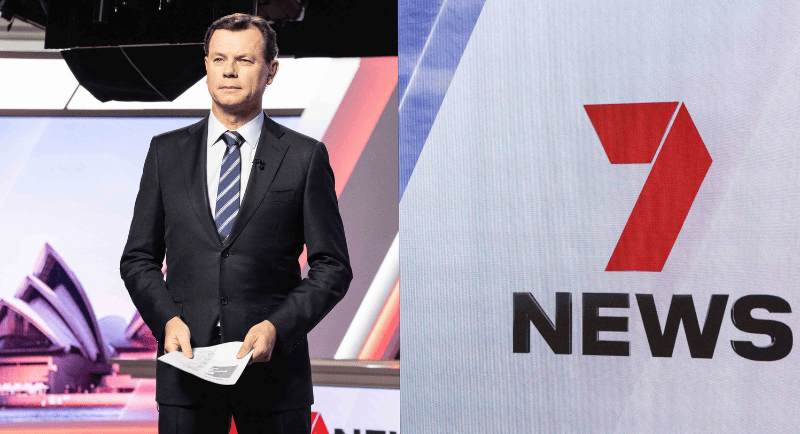Seven’s Sydney 6pm newsreader Mark Ferguson this week is quietly celebrating 40 years in the news business.
Never one to miss an opportunity, the Seven PR team has invited some of the media to the Festival of Fergo. Mediaweek was offered the chance to spend an afternoon with the newsreader at Seven HQ.
Ferguson has a key role at Seven News Sydney, presenting the highest-rating hour of the day. It’s a timeslot that attracts a premium for advertisers. In the new world of TV ratings, we can’t report on how the numbers fall in Sydney. What we do know though is that Seven News is the clear leader nationally with a weeknight reach of around 2m. It easily wins the 6pm hour. The only other program with a bigger reach is Married at First Sight.
We do know that Nine News won the year in Sydney in 2023. But Seven was closing the gap.
Mark Ferguson started in news on regional TV at NEN9 in 1984. He admitted to Mediaweek that a career in media wasn’t his initial plan.
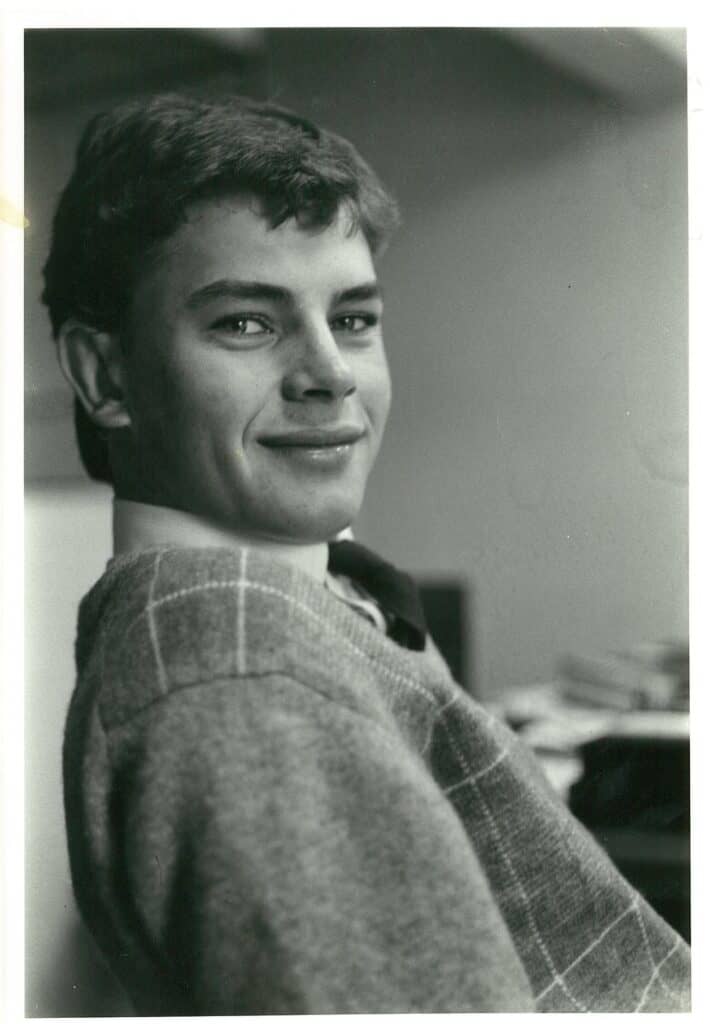
Mark Ferguson aged 18 at NEN9 Tamworth
Ferguson fancied himself as a country vet, maybe in his hometown of Tamworth. That plan was stopped in its tracks by a careers adviser who, after looking at his physics, chemistry and maths marks, told him: “No you’re not.”
Journalism was next on the list, but there was never a plan.
“I have been making it up as I go along since day one,” he grinned.
“Initially I had planned a communications course, but a cadetship came up at the local station. Then I started as a 17-year-old cub journalist in Tamworth. I was very fortunate to get that opportunity and I feel like I’ve been lucky ever since.”
Back then one of Ferguson’s Tamworth colleagues was Seven’s new Sydney news boss Neil Warren. Another Tamworth local in that newsroom was Seven’s Morning Show co-host Kylie Gillies.
The young Ferguson didn’t have to wait long until his first on-air stint. “Not much more than a week.” His first assignment – interviewing then-local member Ian Sinclair. “I was panic-stricken, and I still had a lot to learn.”
His good fortune is a recurring message he shares often during the interview. “I don’t look back much of the time. This anniversary though has made me reflect more than usual.
“The overall feeling is just how fortunate I’ve been to go on the journey I had. I’ve been to far-flung corners of the world, covered some pretty big events and met a lot of interesting characters.”
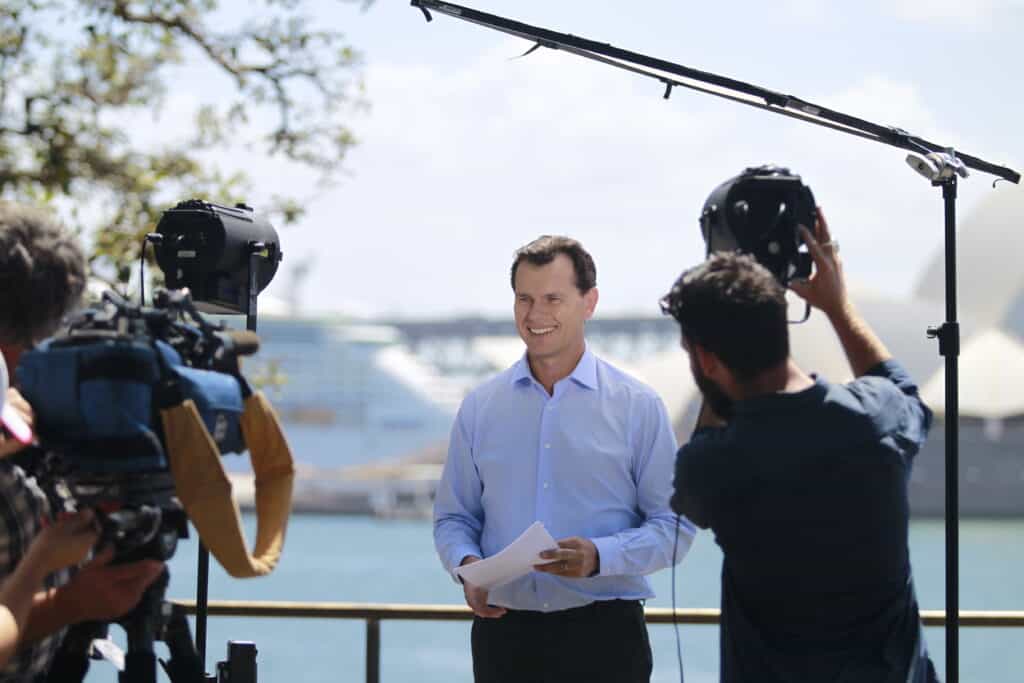
Reporting in Sydney in 2015
Correspondent envy
As we sat halfway up an office tower in a room with no view, I asked if Ferguson missed being out of the office. “Yes, I do.” He offered. “I get correspondent envy quite a bit. Especially when I am crossing to a reporter overseas or presenting a nice colour piece.”
Although he didn’t have an initial plan, after he started, he told Mediaweek: “Being a foreign correspondent was always something I aspired to.
“There was one person who stood out for me and that was Robert Penfold. Leigh Hatcher was another one. I used to see them in their big trench coats outside Buckingham Palace.”
When Nine gave Ferguson his chance overseas he replaced Penfold. “His wonderful run in Europe was coming to an end and I went over and got to spend a bit of time with him for the first month.”
The beat then for the London-based reporter also covered Europe, Africa and the Middle East. “There were different workloads during my time. I look at Hugh Whitfeld and his colleagues and they are flat out churning out content on sometimes limited resources. The news cycle can be punishing for a foreign correspondent.”
Influential colleagues
Ferguson shared the names of just some of the key people he worked with over the years.
“Robin Barlow my first boss in Tamworth after offering me my first job.
“Larry Somerton was my first cap city news director at Seven in Brisbane. He took a real punt on a raw, country-sounding sort of kid.
“Other wonderful people I have worked under include that late news director Ian Cook. Peter Meakin was also very supportive of me over a long period.
“David Leckie the same, as was David Gyngell. One that really does stand out is Ian Ross. He was a wonderful guy and a terrific newsreader.
“Media can be a very competitive business and not everybody wants the young bloke to come through. Ian Ross helped me into newsreading and he spent some time with me. He gave me some wonderful advice that helped me along.”
Newsreader musical chairs
Ferguson remembered back to the time when he was reading the National Nine News and his former colleague Ross was reading the news for Seven. “He was doing better than I was, but he was still in touch telling me I was doing a great job. I have very fond memories of what he did to help me through.”
Ross said he still has friends at Nine. “I still bump into Damian Ryan every now and then. Mark Burrows too.”
Festival of Fergo
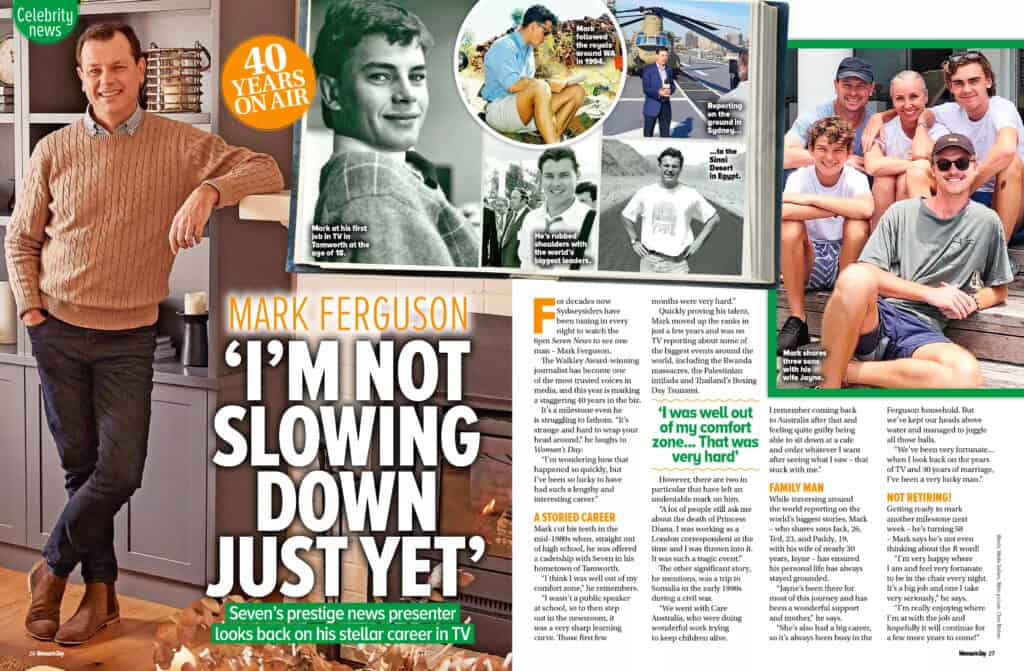
Features this week The Daily Telegraph and Woman’s Day
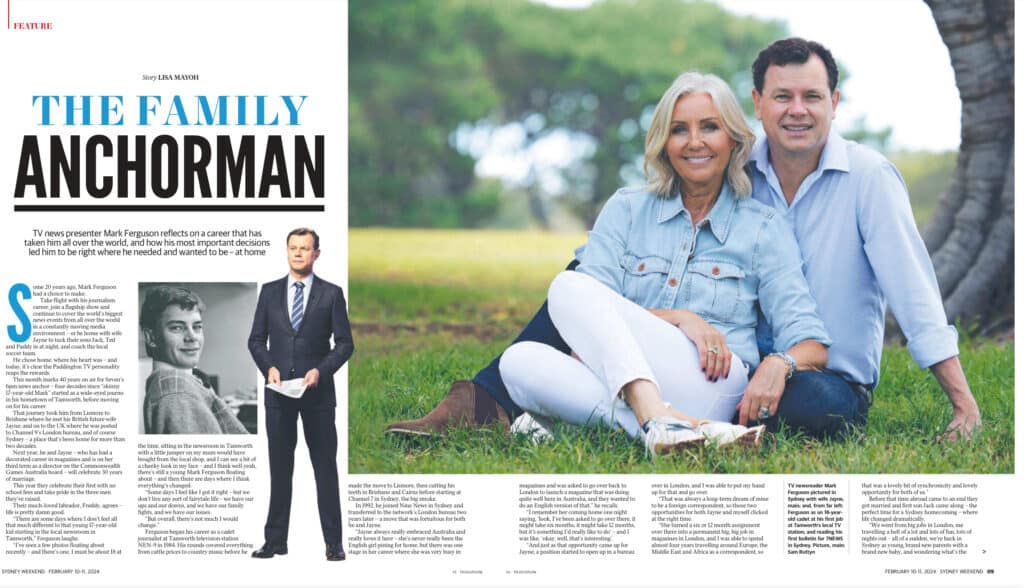
Newsreader popularity
3AW’s Ross Stevenson told a story recently about how Nine did phone research once into who should replace newsreader Brian Naylor in Melbourne.
Ferguson understands the value of research to make sure a channel has the right talent.
“We used to have Q-scores. They would often also be research sessions where viewers are asked about a newsreader’s strengths and weaknesses.
“The daily ratings too are there to pass judgement. From my point of view each and every day I do what I can to make the bulletin shine.
“We have a great team and put out a really good product.”
Changing channels
Ferguson recalled when he left Nine for Seven close to 15 years ago. “Money didn’t come into it. I had sat in the main chair at Nine and sadly that didn’t last. I didn’t want to take a step back, I wanted to keep moving forward.
“Having had the support of David Leckie and Peter Meakin, who were now at Seven, and knowing Ian Ross was stepping down, that’s what got me across the line.”
Ferguson said he’s very happy where he is with no thoughts of moving again. “I think this might be my last stop on the train,” he admitted.
About what eventually might be next, Ferguson said: “As a young bloke from Tamworth, one day I’d like to spend a little more time in the country, but that’s a long way off for me.”
Mark Ferguson’s daily diary
Apart from four weeks of annual leave each summer, Ferguson likes to stay in touch with the news daily. “I still read four printed newspapers each day.” He’ll watch Sunrise and The Morning Show, also consume ABC news programs to see what the news cycle is looking like.
“Emails start about 8am from news about what the day is looking like. Things start to get busier as the day wears on.
Before the main bulletin goes to air, Ferguson promotes the 6pm slot with crosses to radio stations and TV updates from mid-afternoon.

Mark Ferguson in the new Sydney news studio
Reading the rundown
“I like to be organised and know where I’m going and I spend a fair bit of time with the rundown on the computer going through intros and crosses. I like to put my stamp on it when I can.”
When asked what time he gets a script to start reviewing, Ferguson replied:
“Good question, James. The earlier the better. There must be some sort of reason if it’s not available by 5.30pm.
“Some days some of the detail about intros and live crosses start arriving from 3pm. That keeps me busy from then on.”
At about 5.50pm Ferguson will arrive in the studio, maybe do a quick run-through of the opener before the bulletin starts.
Both Seven and Nine 6pm bulletins run ad-free for at least the first 15 minutes to make sure the viewers don’t get an opportunity to leave. Ferguson shared that the longest start he’d seen recently was 21 minutes before an ad. “Fifteen would be quite short these days.”
Getting the content right
“It’s a balancing act each and every day,” said Ferguson about the news director’s job of choosing the items to start the bulletin and deciding what else to tease at the top.
“We have to decide what yarn is of most importance to the community we serve. We get it right most days I feel.”
As to differences between Nine and Seven, Ferguson doesn’t immediately think of any. Is Seven more local maybe? “Possibly. If you go back maybe 20 years there were a few differences. Seven may have looked a little more local back then.
“Part of the era of David Leckie and Peter Meakin [at Seven] was to raise the importance of news within the Seven network. That is still the case today.
“Our news is just about what happened that day and what is of the most importance to Sydney and then the wider community. That guides news decisions across the day.”
State of the art studio
Robots have replaced humans on many studio floors where news is produced. Although he misses the presence of the camera operators, Ferguson said: “the robots are doing a good job so far.”
At Seven’s news facility at its Sydney HQ, also gone are the days of floor managers cueing the presenter with fingers counting down to the start of the bulletin.
Before hidden earpieces were introduced, a host would have a phone on the desk if the control room needed them in a hurry. Now there are voices in the earpiece.
For Mark Ferguson, there are three people he may hear from during a bulletin in addition to sports presenter Mel McLaughlin, weather presenter Angie Asimus or any reporters who may join him during the hour.
The only people on the studio floor these days are the teleprompter operator and a floor manager to mic up guests and reporters who join Mark at the desk during the bulletin.
The first of three people in Ferguson’s earpiece during a bulletin is an automated voice counting down to the start of the bulletin.
The other two are stationed in Seven News’ control room. “Sometimes they both want to talk at once,” grinned Ferguson.
“One of them is the director and is the main point of contact regarding which camera I should be looking into. The other is looking after line-up and they sit beside the executive producer. They will share decisions made about stories that are dropped or others that have been added.”
When it comes to receiving instructions, Ferguson noted he “was not one who likes a lot of chatter in his ear. I liked to be locked in and know where I am going.
“We have a great team who know what they are doing and who get it right every night.”
The planned run sheet often changes and sometimes the pressure to finish the bulletin by 7pm is down to the skill of Seven’s weather presenters. “Angie and David Brown are two fabulous operators who can cut 20 seconds out of a weather bulletin and you’d never know.”
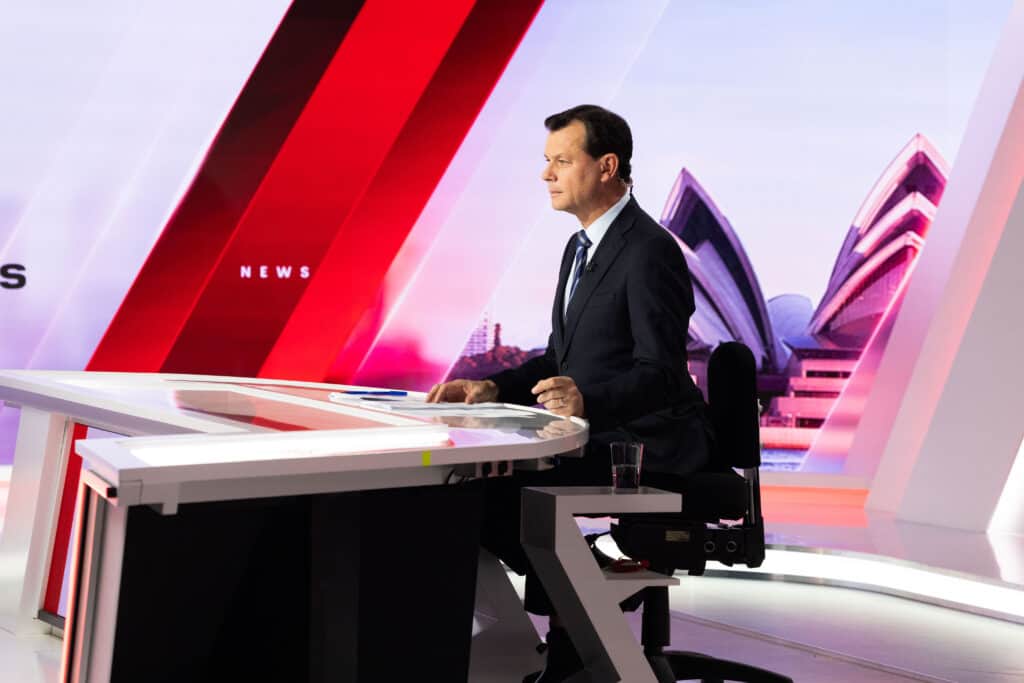
In 2023 Seven News was closing the ratings gap with Nine in Sydney
We’re going live
Treating the microphone as if it was always live and thinking the audio could end up on social media are good rules, said Ferguson. “But it doesn’t always work that way. Sometimes something might catch my eye and I can’t help making some sort of comment.
“I am trying to be more disciplined from here on. I have read a few horror stories in the last year.”
The autocue going on the fritz would be a horror story which is why the newsreader still has a hard copy backup of the script on the desk in front of him.
Seven’s news boss
Mediaweek interviewed Seven’s head of news and current affairs Craig McPherson in September last year. Ferguson gets on well with the news boss.
“I find Craig McPherson a good operator with good instincts. He has made some great hires. A very steady presence. Very cool, very calm. He just gets on with the job which is similar to my approach I would like to think.”
The decision to move Seven News from the Sydney CBD to the inner west is something Ferguson also approves of. “The studio we get to work from every night now is an example of the amount of change in our industry. It’s so different to where we were at Martin Place. It’s a wonderful vote of confidence in the future of Seven News. To spend that sort money on the studio…I couldn’t believe it the first time I walked in. I initially thought I was on a Hollywood set. It’s superb.”
Watching the ratings
As to how the ratings look daily, Ferguson said he keeps on top of the numbers. “We get emails each morning. We still get the state figures, but not the overall figure that is released publicly later in the morning. I will go looking to see how we went overall.
“Anyone who says they are not checking those numbers most days is probably telling you a furphy.
“It remains a very competitive business and you like to think people are watching.”
